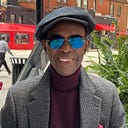Member-only story
WOMEN | GENDER | POLITICS
Three Female Perspectives on the ‘Woman’ Question
Birth sex, gender identity, and the law as viewed by J.K. Rowling, Miley Cyrus, and Supreme Court Justice Ketanji Brown Jackson.

Here we are nearing the end of Women’s History Month 2023. And thanks to a new podcast about J.K. Rowling, which frames the author as the victim of a modern day witch trial, people are once again asking that perplexing question: “What is a woman?”
Recently, I wrote a lengthy piece on another platform about the controversy surrounding the Harry Potter author after she posted a series of tweets and wrote an essay regarding her concerns about transgender women versus biological women.
My interest in the author came from reading her ongoing C.B. Strike crime-fiction series. I didn’t get into the Harry Potter novels until years after the initial fever over them had died down.
But once I began to read her, I found Rowling to be a talented author with extraordinary insights into personal relationships. Although I rarely read crime novels, I’ve been captivated by the C.B. Strike stories.
After I wrote my article about Rowling, which was really an exploration of the several controversies surrounding transgender rights, I realized that it contained three specific takes on the definition of woman.
It occurred to me that these three perspectives were worth restating on their own. Which is why I’ve decided to revisit them here in slightly different form.
J. K. Rowling
The author’s thoughts on this subject are probably well known by now. She didn’t just take to Twitter to question the term “people who menstruate.” She also tweeted her support for a biological woman who’d lost her job for referring to transgender women as men on social media.
Basically, her concerns come down to the following:
- She believes that the difference between gender and sex is real.
- She does not believe that gender identity is innate in the same way that sexual orientation is innate.
- She’s concerned that social pressure might influence kids to believe they’re in the wrong body and should change gender.
